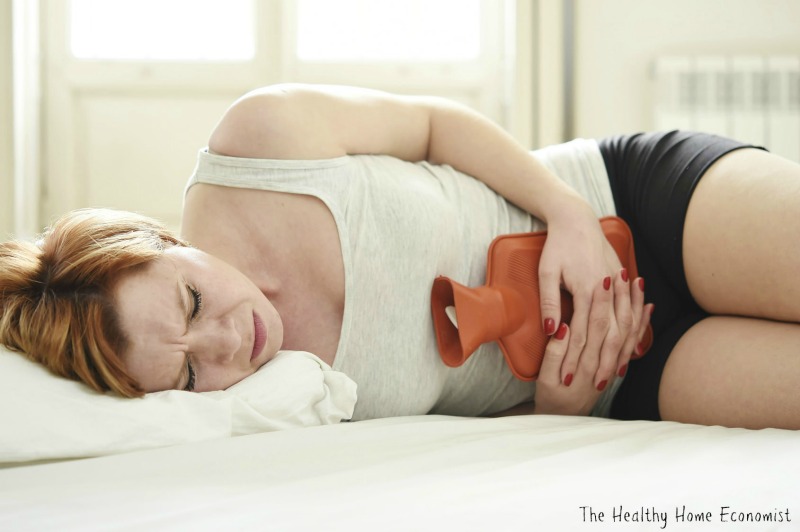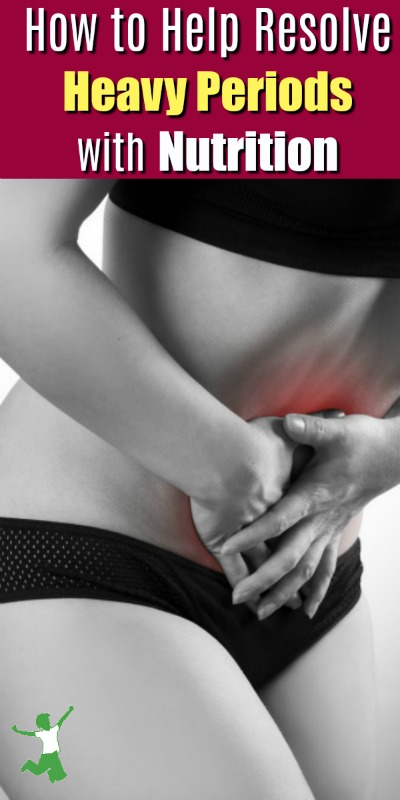Heavy periods are a health risk over the long term that most women do not realize can frequently be resolved with dietary intervention. Try this approach first before resorting to surgery or drugs to address the problem!

Heavy periods, or menorrhagia, is a common problem for women particularly as they approach menopause. It is also a problem for women with endometriosis.
This problem has also emerged as a common side effect of vaccination for coronavirus. Post-menopausal women are even experiencing breakthrough bleeding. (1)
Excess estrogen can frequently be a cause too. Estrogen dominance is a real threat in our modern environment loaded with estrogen-mimicking chemicals like BPA and pesticides seemingly everywhere.
In addition, estrogenic foods like soy are an ingredient in a majority of processed foods.
Be aware that soy protein and soya milk can trigger similar effects as edamame or other whole forms of soy.
Heavy periods put a woman at risk for anemia, infertility, weakness, and persistent fatigue if not corrected.
Unfortunately, conventional treatments for this condition involve only drugs and surgery. Options include the birth control pill, hormone-releasing IUDs, hysterectomy, or a more recent technique called endometrial ablation.
I know several women who have undergone endometrial ablation in recent months to combat heavy periods.
This surgical technique involves the destruction of the uterine lining either with a laser, radiofrequency or microwaves, or heated water.
The ladies I know who have had this procedure swear by it and were very happy with the results. However, this approach is not an option for younger women who want to have children.
It is also best to avoid a surgical procedure unless absolutely necessary. Complications are always possible such as infection of the bladder or damage to the womb or large intestine.
Nutritional Intervention for Menorrhagia
The good news is that heavy and/or irregular periods frequently respond well to simple nutritional support.
This approach also helps significantly with cramping. Heavy cycles are frequently painful ones as well.
Natural Vitamin A
Vitamin A is known to help with excess estrogen so a simple increase in the amount of natural Vitamin A in the diet can help reduce heavy cyclical bleeding.
The Vitamin A must be natural and not synthetic. Excess intake of synthetic Vitamin A can produce deleterious effects.
In fact, some researchers believe that synthetic vitamin A interferes with the proper utilization of natural vitamin A from food. Thus, avoidance of the many synthetically fortified foods on the market is important as well. (2)
Plant-based Sources Ineffective
It is important to note that beta carotene will not help here! The source must be true vitamin A best found in ideal doses in high vitamin cod liver oil.
According to a case study written about in the book Eat Fat, Lose Fat, 2 tablespoons of high vitamin cod liver oil per day supplying about 60,000 IU of Vitamin A for 3 days in a row eliminated this debilitating problem for one woman who had been suffering from what she called a “never-ending period” for 4 years. (3)
Ongoing Supplementation
Note that a daily maintenance dose of high vitamin unheated cod liver oil (1 tsp per day) after that was sufficient to keep the problem of heavy periods from returning.
This brand is what my family takes.
Cod Liver Oil for Heavy Periods Before Drugs or Surgery
Do you suffer from heavy periods and have reached the end of your rope? If you are considering surgery, why not try this simple remedy to see if it might work for you?
Be sure to use ONLY high vitamin cod liver oil that contains natural Vitamin A. I recommend Dropi cod liver oil.
Most of the brands on the market today use synthetic Vitamin A instead of the real thing.
Worse, it is not clearly labeled.
Using cod liver oil with synthetic A or supplements containing beta carotene will not be helpful for resolving heavy periods.
For vetted and tested sources of high vitamin cod liver oil that use only natural Vitamin A and no synthetics, check my Resources page.

References
(1) Post-vaccine menorrhagia, metrorrhagia or postmenopausal bleeding
(2) Vitamin A Saga
(2) Eat Fat, Lose Fat








So timely. I can not tell you how much I appreciate this post. I begrudgingly started medication this week to allieviate the pain and bleeding after trying everything I could think of. Moving on to FCLO ….ordered it just now 🙂
femmenessence is amazing!
Thank you for this post. I also get pretty bad PMS, bloating, upset stomach, grouchiness, and cramping. Will this help with those symptoms as well, or is there something else? Thank you.
Get your diet right and your period will be the nonevent it should be no matter what a woman’s age – brief and light. There is no reason for monthly cycles to cause any discomfort or problem whatsoever and if they do, action needs to be taken to balance the hormones and/or rectify nutritional deficiency.
Sarah,
I have been trying to transition to a better diet, however how do I know what comes next? There is no “raw” anything around here that I can find (or afford). can you email me so I can ask you a question or two “off boards” so to speak?
My daughter has very painful periods. We have eaten a traditonal ever since she’s been little. Still her peroids are not that heavy, but extemely painful. I’ve just recently came across an article on health site stating that some women have too small of a cervical opening and this causes the uterus to contract like in labor. This is what she describes the pain as. Unbearable for a while and then tapers off and continues for two days. The blood also turns brown by the second day, so this also tells me that she is not flowing heavy enough.
Also, GLA found in borage oil or evening primrose oil can be extremely helpful!
“#VitaminA is known to help with excess #estrogen” http://t.co/oOewp601
My 16 yr old daughter has this problem most months. She went for 3 months without one and then 3 months of non stop… and terrible pain too…
Another good reason to keep taking my FCLO 🙂
Wow, I wish I knew about this several years ago. It looks like age is resolving the issue now (I’m 50, almost 51). Now the miracle nutritional cure I would like is something that could arrest/reverse menopause and boost fertility.
Sarah,
Do you know if the IUDs (Mirena with hormones and Paragard with copper) have the same effect on the digestive bacteria?
Thank you,
Anne
I’ve looked at them all and was not sufficiently impressed with any of them 🙁
My friend is having AWFUL periods, and was concerned today especially, so once again a very timely article!